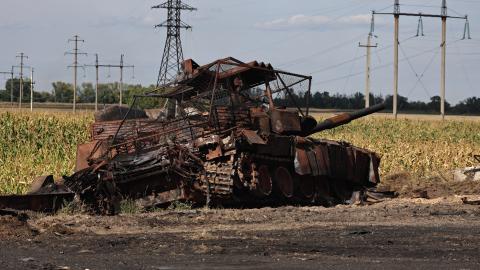For the first time in more than 80 years, Russian territory has been invaded. Ukrainian forces crossed the state border in a surprise move, entering the Kursk Oblast with thousands of troops and hundreds of armored vehicles.
There has been heavy fighting, with Russia scrambling to reinforce the area. The Ukrainians have captured more than 70 villages. More than 130,000 Russian civilians have been displaced since Ukraine launched its operation on Aug. 6. According to open-source intelligence, Ukraine now controls approximately 1,000 square kilometers of Russian territory — an area slightly larger than Bahrain.
While Ukraine’s audacious military operation may have caught some off guard, the location and timing of this offensive were far from coincidental.
Kursk Oblast has deep historical ties to Ukrainian culture. In the 17th and 18th centuries, Ukrainian peasants, Cossacks, and other settlers were granted “slobodas” in what is now modern-day Kursk, Belgorod and Voronezh oblasts in Russia, and Sumy and Kharkiv oblasts in Ukraine. This region was known as Sloboda Ukraine. These slobodas enjoyed significant governing autonomy and tax-free status, fostering a unique cultural identity that is still evident to this day. Although accurate census data is scarce, it is believed that tens of thousands of ethnic Ukrainians currently reside in Russia’s Kursk Oblast. Consequently, a military operation in Kursk resonates positively, emotionally and sentimentally with the Ukrainian public.
Kursk Oblast is also home to crucial transport links, including major highways for the movement of military supplies and troops. The Sudzha gas terminal, critical for the remaining Russian natural gas exports to Europe, is in Kursk Oblast. Ukrainians control the terminal, but there has been no noticeable reduction in gas flow thus far. The Kursk railway hub connects central Russia with southwestern regions, including the border areas near Ukraine, making it vital for logistical support. Ukrainian military planners were undoubtedly aware of the logistical importance of Kursk.
Another important consideration was the terrain. The topography of Kursk Oblast near the Ukrainian border is suitable for the type of warfare involving armored vehicles and tanks that Ukraine is conducting. This facilitated Ukraine’s rapid advance. After all, Kursk was the site of a major Second World War battle, the largest tank battle in history.
The timing of Ukraine’s military operation is also no coincidence. Most of the world was distracted, at least initially. It is well known that many Europeans treat August as a vacation month. August is a big political month in the US during an election year and focus in the States has been on the race for the presidency. Meanwhile, much of the world was engrossed in the Olympic Games.
From a logistical standpoint, the timing also made sense. It has been four months since the US Congress passed its most recent aid package for Ukraine. It probably took this amount of time for the Ukrainians to feel the positive impact of the aid in terms of equipment, weapons and munitions arriving from the US.
Weather conditions also played a crucial role in the timing. If traditional weather patterns hold, an August campaign gives Ukraine enough time to make advances but may not allow Russia sufficient time to counterattack before the muddy season arrives in the fall. In 2022, Ukraine launched its highly successful Kherson counteroffensive in August too.
Although probably more of a coincidence than anything else, it is worth noting that Ukraine’s Kursk operation also began during the same week as the anniversary of Russia’s 2008 invasion of Georgia. Evidence on social media shows Georgian volunteers fighting alongside Ukraine inside Russia.
So, what is Ukraine hoping to achieve by invading Russia? The first goal is to change the narrative of the war. In recent months, the conflict has been characterized as a stalemate. Russia has made minor territorial gains in Donetsk and Ukraine looks like it is on the back foot. By entering Russia and seizing territory, Ukraine now appears to have the upper hand in the conflict, shifting the war narrative in international media in a way that is more favorable to Kyiv.
Second, Ukraine hopes that Russia will be forced to divert resources — both manpower and equipment — from other locations along the front line to deal with the situation in Kursk. Even though 1,000 square kilometers is small relative to the overall size of the Russian Federation, even a single square meter under Ukraine’s control creates political problems for the Kremlin. At a minimum, forcing Russia to divert resources away will ease the pressure on some of the more difficult sections of the front line for Ukraine. It could even create opportunities for Ukraine to advance in other areas along the front.
Finally, and perhaps most crucially, Ukrainian control of Russian territory means that the conflict cannot be “frozen” along the existing front lines as part of a negotiated settlement. If Ukraine can maintain control over some Russian territory, it makes a land swap more likely. Therefore, Ukrainians believe that to regain more of their territory from Moscow, they must first control some of Russia’s.
Controlling Russian territory gives Ukraine a stronger hand to play at peace talks in the future — especially if Ukraine retains control over the Sudzha gas terminal. But for this strategy to succeed, Ukraine must avoid overextending itself by taking control of more Russian territory than it can hold and defend.
Expectations for Ukraine’s counteroffensive last year were high, only for Kyiv’s supporters to be disappointed when little progress was made. It remains to be seen if this year’s surprise operation into Russia will be different. But if it is successful, it could dramatically change the outcome of the war.
Enjoyed this article? Subscribe to Hudson’s newsletters to stay up to date with our latest content.



















